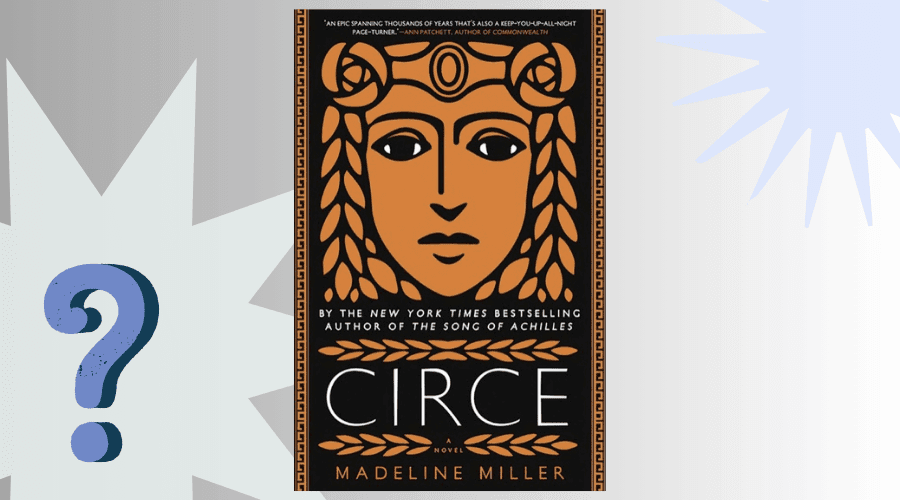Circe by Madeline Miller is an excellent choice for a book club! The novel offers a rich blend of mythology, character development, and timeless themes that can spark deep discussion. Here are some reasons why it’s great for a book club:
- Strong Themes: The book explores powerful themes like self-discovery, power, love, identity, and independence. These themes are relatable and can lead to insightful conversations about personal growth and empowerment.
- Complex Characters: Circe herself is a complex and evolving character. The exploration of her relationships with other gods, mortals, and monsters offers a lot to unpack, especially when it comes to how power dynamics and gender roles play out in the story.
- Mythological References: The novel is rooted in Greek mythology, but Miller gives it a fresh, modern twist. If your book club enjoys discussing mythological retellings or exploring how ancient stories can still resonate today, Circe is a fantastic choice.
- Rich Writing Style: The lyrical, poetic prose can be a great talking point, and members may appreciate how Miller blends the beauty of language with emotional depth.
- Accessible Yet Thought-Provoking: While Circe is rooted in mythology, it’s written in a way that makes it accessible to readers of all backgrounds. It’s not too heavy on technical mythology, so everyone in your club can enjoy it, even if they aren’t familiar with Greek myths.
Overall, Circe is a thoughtful, engaging book that will encourage lively discussion and allow members to explore deeper meanings and perspectives.
20 Circe Book Club Questions
Here are 20 book club questions to spark thoughtful discussion on Circe by Madeline Miller:
Character Development & Relationships
- How does Circe evolve throughout the novel? What key events or relationships contribute to her transformation?
- What is the significance of Circe’s exile to the island of Aiaia? How does this isolation affect her character development?
- How does Circe’s relationship with her family, especially her father Helios and her mother Perse, shape her identity?
- Discuss Circe’s relationship with Odysseus. How does their dynamic reflect themes of power, love, and independence?
- What role does Circe’s relationship with the mortal men (like Glaucus and Telemachus) play in her personal growth?
- How does Circe’s perception of love and relationships change over the course of the novel?
- How does Circe’s interaction with other gods, like Hermes or Scylla, shape her understanding of power and immortality?
Themes & Symbols
- What does Circe’s use of magic represent in the story? Is it a source of empowerment or a tool for manipulation?
- How does the novel explore the theme of self-discovery and the search for identity?
- What is the significance of Circe choosing to become mortal at the end of the novel? What does this decision say about her character?
- How does Circe challenge traditional gender roles? In what ways does Circe defy expectations placed on women, both by gods and mortals?
- The novel often explores the consequences of actions. How do Circe’s choices impact those around her, and what does this suggest about responsibility and fate?
- How does the theme of isolation and loneliness play a role in the story? How does Circe cope with her isolation over the years?
Mythology & Interpretation
- How does Miller’s retelling of Greek mythology differ from the traditional versions of these stories? What new perspectives does she bring?
- Discuss the portrayal of the gods in the novel. Are they more human or divine in their actions? What does this say about power and morality?
- How does the myth of the Minotaur in Circe enhance the story’s themes of transformation and monstrosity?
- What role does fate play in the novel? How do characters, particularly Circe, grapple with their destiny versus their own choices?
- Circe’s story is intertwined with many other myths. How does Miller’s version offer a fresh take on well-known myths like that of Odysseus or Scylla?
Writing & Style
- How would you describe Madeline Miller’s writing style in Circe? Does the lyrical prose enhance or distract from the story?
- How do you think the first-person narration affects the story? Would the novel be as impactful if it were told from a different perspective?
These questions should encourage deep reflection on the characters, themes, and storytelling in Circe, making for a lively and engaging book club discussion!
Circe: Discussion Topics
Here are some engaging discussion topics for your book club to explore while reading Circe by Madeline Miller:
The Power of Transformation
Discuss the recurring theme of transformation in Circe. How do physical and emotional transformations reflect Circe’s journey? What other characters in the novel experience transformation, and how does it shape their stories?
Circe’s Relationship with Power
How does Circe’s relationship with power evolve throughout the novel? In what ways does she learn to embrace her magical abilities? How does her growing power affect her relationships with others, particularly the gods and mortals?
Isolation and Solitude
A major theme in the novel is Circe’s isolation on Aiaia. How does solitude shape her character? Do you think isolation is something that strengthens her, or does it deepen her vulnerabilities? How does her isolation compare to the isolation of other characters in the book?
Love and Betrayal
Circe’s relationships with men (like Glaucus and Odysseus) are central to the story. How does the novel explore love, longing, and betrayal? What do these relationships teach Circe about power, independence, and trust?
Feminism and Gender Roles
Circe can be seen as a feminist retelling of a myth. How does Circe break free from traditional gender roles and expectations placed on her by the gods and society? In what ways does her story challenge the patriarchy, both in ancient mythology and in modern contexts?
Immortality vs. Mortality
At the end of the novel, Circe chooses mortality. What does this decision signify for her character? How does this choice reflect her understanding of life, love, and self-worth? How do the gods’ immortality and their relationships with mortality contrast with Circe’s journey?
The Gods and Their Flaws
The gods in Circe are portrayed as powerful but deeply flawed beings. Discuss how the gods’ behavior is more human than divine in the novel. How does this portrayal of the gods affect the story and themes of justice, power, and morality?
The Concept of Monstrosity
Circe has the ability to turn others into animals, and many characters in the book are transformed in some way. How does the concept of monstrosity evolve throughout the novel? Who is truly monstrous: Circe, the gods, or the people she encounters? What does it mean to be a “monster” in the context of the story?
Self-Discovery and Identity
Circe’s journey is one of self-discovery and finding her own voice. How does her perception of herself change as she learns to navigate the world on her own terms? How do the other characters influence her sense of identity, and how does she ultimately define herself?
The Role of Mortals in a World of Gods
In a world dominated by gods, what is the significance of the mortal characters, such as Odysseus, Glaucus, and Telemachus? How do these mortals shape Circe’s worldview and her understanding of what it means to live and love?
These topics should foster engaging and thought-provoking conversations, allowing your book club to dive deeply into the rich themes and characters of Circe.
Circe Book Club Food Ideas
For a Circe book club meeting, you can create a magical, Greek-inspired menu that reflects the themes and setting of the novel. Here are some fun and thematic food ideas to bring the world of Circe to life:
- Greek Meze Platter: A spread of small dishes, perfect for sharing, that could include:
Hummus: A creamy dip made from chickpeas, tahini, and olive oil.
Tzatziki: A yogurt and cucumber dip with garlic and dill.
Dolmas: Stuffed grape leaves filled with rice, herbs, and sometimes pine nuts.
Olives: A variety of Greek olives for snacking.
Feta Cheese: Serve with bread or crackers for a simple but delicious treat. - Grilled Lamb Skewers: Greek cuisine often features lamb, which is a hearty and flavorful choice for a book club snack. You can marinate the lamb with garlic, lemon, and oregano before grilling or roasting.
- Spanakopita (Spinach Pie): A traditional Greek pastry made of phyllo dough, stuffed with a mixture of spinach, feta cheese, and herbs. It’s delicious, portable, and perfectly fits the Greek mythology theme.
- Greek Salad: A fresh, vibrant salad with cucumbers, tomatoes, red onions, Kalamata olives, and feta cheese, all drizzled with olive oil and oregano. It’s a light and healthy option that ties back to the Mediterranean flavors.
- Baklava: For dessert, serve Baklava, the famous Greek pastry made of phyllo dough, honey, and chopped nuts like pistachios or walnuts. It’s sweet, rich, and perfect for a celebratory treat.
- Pomegranate Punch: Pomegranates are often associated with Greek mythology, especially with Persephone’s story. A pomegranate punch (alcoholic or non-alcoholic) would be a refreshing drink. Mix pomegranate juice, soda, and a splash of lemon for a citrusy burst, or add a little gin for an extra kick!
- Greek Yogurt with Honey and Nuts: A simple, yet elegant dish made with Greek yogurt, drizzled with honey, and topped with crushed nuts like almonds or walnuts. This dish ties back to Circe’s magical use of natural ingredients and is a great light option.
- Fig and Cheese Platter: Figs appear in Greek mythology as a symbol of fertility and prosperity. Pair fresh or dried figs with cheese like Brie or Manchego for a sophisticated snack.
- Cucumber and Herb Finger Sandwiches: Light and refreshing, these sandwiches with fresh cucumbers, dill, and a little cream cheese can mimic the herbs Circe might use in her potions. They’re perfect for nibbling while discussing the novel.
- Nectar and Ambrosia-Inspired Drinks: For a playful nod to Greek mythology, serve a drink inspired by nectar and ambrosia, the mythical food and drink of the gods. You can create a fruity, tropical punch with a mix of pineapple, mango, and orange juice, or for something more unique, serve a sparkling wine punch.
These food ideas should help create a fun and immersive experience for your Circe book club, tying in the ancient Greek theme while enjoying delicious treats together!

